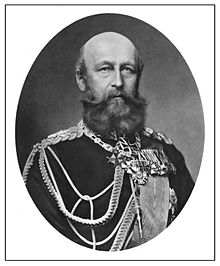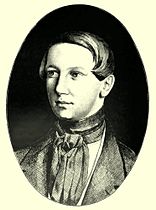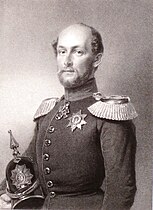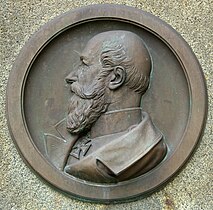Friedrich Franz II. (Mecklenburg)
Friedrich Franz II, Grand Duke of Mecklenburg [-Schwerin], (born February 28, 1823 in Ludwigslust , † April 15, 1883 in Schwerin ) was Grand Duke of Mecklenburg in the Mecklenburg-Schwerin part of the state and ruled between 1842 and 1883.
Family and life
Friedrich Franz II. Was the son of Grand Duke Paul Friedrich (1800–1842) and Alexandrine of Prussia (1803–1892), the fourth daughter of the Prussian King Friedrich Wilhelm III. (1770–1840) from his marriage to Princess Luise (1776–1810). Friedrich Franz (II.) Spent his first youth in Ludwigslust under the eyes of his parents and at the court of his great-grandfather, the reigning Grand Duke Friedrich Franz I. After his domestic upbringing, he attended Blochmann's educational institution in Dresden from November 1837 . The Hereditary Grand Duke then studied law in Bonn and successfully completed the studies that he began there at the State University of Rostock. After the death of his father in 1842, Friedrich Franz II became Grand Duke of Mecklenburg-Schwerin at the age of 19. During the years of his reign he traveled a. a. to Russia , Italy and the Orient .
Reign
Political activity
In the Revolution of 1848-49 Friedrich Franz took a completely uncompromising attitude and issued in 1849 against the interests of their own relatives as "fundamental law" a liberal constitution for he governed part of the country, but in Freienwalder award was lifted 1850th Not least because of this constitution, he was considered a popular prince until death.
During his reign, which lasted more than 40 years, he initiated numerous reforms, including the reform of the judiciary, the restructuring of the regional gendarmerie, the internal reform of the regional church and the improvement of the country's hospital system. The expansion of the country's traffic routes was also continued during his reign, 1500 km of paved roads had been created by 1882 and the Friedrich-Franz-Bahn was in daily service on several routes.
Military action
The military reforms started by Grand Duke Paul Friedrich were continued by Grand Duke Friedrich Franz II. The country's military units were reorganized under his leadership. Under the leadership of the Grand Duke, the Grand Duchy of Mecklenburg-Schwerin concluded a military convention with Prussia on July 24, 1868, which regulated the transfer of officers to the Prussian army; later the Mecklenburg troops were fully included in the budget of the Prussian army.
Shortly after taking office, the Grand Duke was appointed Chief of the 24th Infantry Regiment by the Prussian King on March 19, 1842 , along with his promotion to Major General .
On March 12, 1854, he was promoted to General of the Infantry . When the Prussian king offered him command of a Prussian army corps in 1864 before the German-Danish War , he turned it down. The reason was a possible threat to the Mecklenburg coast from Denmark ; at that time there was no effective sea fleet available to guarantee protection. On the other hand, Friedrich Franz II had been friends with the Danish king since he was a student in Bonn. For this reason, the Grand Duke was largely neutral, but according to his wishes, he joined the Prussian headquarters on February 1, 1864 and followed the action on the staff of Field Marshal von Wrangel . He was subsequently awarded the swords for the Order of the Red Eagle .
In the subsequent German War of 1866 he led the II Reserve Corps on the Prussian side, which was deployed in the Bavaria area. In recognition of his services in the campaign, the Grand Duke was awarded the order Pour le Mérite on August 9, 1866 .
In the Franco-Prussian War of 1870/71, the Grand Duke did not arrive at the theater of war near Metz until September 1, 1870, after no French landing operations against the north German coast . As commanding general, he took over the leadership of the XIII. Army Corps . In mid-September he had received from General Moltke the task of protecting the back of the main army of Crown Prince Friedrich Wilhelm advancing on Paris . For this he also took over the command of a new army department, consisting of the Bavarian I. Army Corps , two Prussian cavalry divisions and his own XIII. Army Corps. He was able to secure the space between Chalons and Reims and also occupy the rear fortress of Toul . After Soissons had also been defeated, he and his troops took part in the siege of Paris at the end of October . On December 2, 1870, his army department at Loigny-Poupry triumphed over the French under General d'Aurelle de Paladines and occupied Orléans on December 5 . In the Battle of Le Mans from January 10 to 12, 1871, under the command of Prince Friedrich Karl of Prussia, the last French Loire Army under General Chanzy was completely crushed. At the imperial proclamation in Versailles on January 18, 1871, he was represented by his son Friedrich Franz . His troops marched into Normandy via Alençon and occupied Rouen on January 25th . After the peace on June 16, 1871, Kaiser Wilhelm I assigned him the Second Army Inspection and on September 2, 1873 appointed the Grand Duke Colonel General of the Infantry with the rank of Prussian Field Marshal. At the same time he was appointed Russian Field Marshal General.
marriage
Grand Duke Friedrich Franz II entered into the marriage bond three times. On October 20, 1849, he married Auguste Reuss zu Schleiz-Köstritz , and this connection resulted in six children. Grand Duchess Auguste died in 1862 after failing to recover from the delivery of her last child, Duke Alexander, in 1859. In 1864 the Grand Duke married the 21-year-old Princess Anna of Hesse-Darmstadt , daughter of Prince Karl of Hesse-Darmstadt (1809–1877), who died a year later after the birth of their daughter Anna. After a mourning period of three years, the Grand Duke married in Rudolstadt Princess Marie of Schwarzburg-Rudolstadt , daughter of Prince Adolf von Schwarzburg-Rudolstadt (1801-1875), who survived him by almost four decades. From this marriage there were four children.
After the grand ducal family had only six people in the 1840s, the successor to the House of Mecklenburg-Schwerin was secured in the 1850s.
progeny
First marriage with Auguste Reuss zu Schleiz-Köstritz (1822–1862), daughter of Prince Heinrich LXIII. Reuss to Schleiz-Köstritz:
- Friedrich Franz III. (1851-1897)
- ⚭ 1879 Anastasia of Russia (1860–1922)
- Paul Friedrich (1852-1923)
- ⚭ 1881 Princess Maria von Windisch-Graetz (1856–1929)
- Marie (1854-1920)
- ⚭ 1874 Grand Duke Vladimir of Russia (1847–1909)
- Nicholas (1855-1856)
- Johann Albrecht (1857-1920)
- ⚭ 1886 Princess Elisabeth of Saxe-Weimar-Eisenach (1854–1908)
- ⚭ 1909 Princess Elisabeth zu Stolberg-Roßla (1885–1969)
- Alexander (1859-1859)
Second marriage to Anna von Hessen and bei Rhein (1843–1865), daughter of Prince Karl von Hessen-Darmstadt :
- Anna (1865-1882)
Third marriage with Marie von Schwarzburg-Rudolstadt (1850–1922), daughter of Prince Adolf von Schwarzburg-Rudolstadt:
- Elisabeth (1869–1955)
- ⚭ 1896 Grand Duke Friedrich August von Oldenburg (1852–1931)
- Friedrich Wilhelm (1871-1897)
- Adolf Friedrich (1873–1969)
- ⚭ 1917 Princess Viktoria Feodora Reuss (1889–1918)
- ⚭ 1924 Elisabeth zu Stolberg-Roßla (1885–1969), widow of his half-brother Johann Albrecht.
- Heinrich (1876–1934)
- ⚭ 1901 Queen Wilhelmina of the Netherlands (1880–1962)
Monuments
- 1856 memorial plaque on the Hohe Dachstein
- 1877 sandstone relief on the 1870/71 war memorial in Malchin by Adolph Siegfried (destroyed)
- 1885 sandstone bust in Dömitz by Paul Mowitz (destroyed)
- 1885 bronze relief on the war memorial 1870/71 in Lübz by Ludwig Brunow
- 1887 bronze bust on the teachers' seminar in Neukloster by Hugo Berwald , which was moved from Ludwigslust to Neukloster in 1862 (destroyed)
- 1890 bronze bust on the war memorial 1870/71 in Penzlin (destroyed)
- 1892 statue ( copper work ) in the facade of the Rostock estate house by Ludwig Brunow
- 1893 bronze equestrian statue in the palace gardens of Schwerin by Ludwig Brunow
- 1893 bronze relief on the 1870/71 war memorial in Laage by Hermann Hultzsch
- 1895 bronze relief on the 1870/71 war memorial in Schwaan by Hermann Hultzsch
- 1897 bronze relief on the war memorial 1870/71 in Vellahn (destroyed)
- 1898 bust monument in the Kaiser-Wilhelm-Turm am Hallo in Essen-Stoppenberg by L. Brunow (destroyed)
- 1902 bust (Herme) in the Upper Lusatian Hall of Fame Görlitz by L. Brunow (destroyed)
- 1913 bronze relief on the war memorial 1870/71 in Dargun (destroyed)
In Tempelhof near Berlin, Friedrich-Franz-Strasse was named after him before 1882.
gallery
Auguste Reuss zu Schleiz-Köstritz (sculptor wall tailor )
Bust monument to Grand Duke Friedrich Franz II in Essen-Stoppenberg
aftermath
The State Museum Schwerin honored the builder of the State Gallery opposite the Schwerin Palace in 2007 as an art sponsor with an exhibition.
literature
- Gustav von Glasenapp : Military Biographies of the Officer Corps of the Prussian Army. Berlin 1868, p. 24; Text archive - Internet Archive
- Ludwig von Hirschfeld: Friedrich Franz II., Grand Duke of Mecklenburg-Schwerin, and his predecessors. 2 volumes. Duncker & Humblot, Berlin 1891 (Volume 1: archive.org - Volume 2: archive.org ).
- Heinrich von Stein : Friedrich Franz II. And the University of Rostock. Rostock 1891.
- Bruno Garlepp : Friedrich Franz II of Mecklenburg-Schwerin. Wroclaw 1892.
- Berthold Volz : Grand Duke Friedrich Franz II of Mecklenburg-Schwerin. A German princely life. Wismar 1893.
- Friedrich Schlie : The monument of the Grand Duke Friedrich Franz II of Mecklenburg-Schwerin. In memory of August 24th, 1893. Schwerin 1893.
- Carl Schröder: Friedrich Franz III., Grand Duke of Mecklenburg-Schwerin. From his life and his letters. Bahn, Schwerin 1898 ( digitized version ).
- Adolf von Deitenhofen: Foreign princes in the Habsburg army 1848–1898 , Im Selbstverlage, 1898, p. 395 ff.
- Karl Schröder: Friedrich Franz II . In: Allgemeine Deutsche Biographie (ADB). Volume 49, Duncker & Humblot, Leipzig 1904, pp. 96-116.
- Jürgen Borchert : Mecklenburg's Grand Dukes. 1815-1918. Demmler Verlag, Schwerin 1992. ISBN 3-910150-14-4 , pp. 45-69.
- René Wiese: Orientation in the modern age. Grand Duke Friedrich Franz II of Mecklenburg in his day. (= Sources and studies from the state archives of Mecklenburg-Western Pomerania; Volume 8). Edition Temmen, Bremen 2005. ISBN 978-3-86108-053-4 .
- René Wiese: Pre-March and Revolution. The diaries of Grand Duke Friedrich Franz II of Mecklenburg-Schwerin 1841–1854. (= Sources and studies from the state archives of Mecklenburg-Western Pomerania; Volume 16). Böhlau, Cologne 2014. ISBN 978-3-412-22271-0 .
- René Wiese: Friedrich Franz II. Rule under the sign of revolution and the establishment of an empire. In: Bernd Kasten , Matthias Manke , René Wiese: The Grand Dukes of Mecklenburg-Schwerin. Hinstorff Verlag , Rostock 2015. ISBN 978-3-356-01986-5 , pp. 68-101.
Web links
- Literature by and about Grand Duke Friedrich Franz II in the catalog of the German National Library
- Literature on Grand Duke Friedrich Franz II in the state bibliography MV
Individual evidence
- ^ Berthold Volz: Grand Duke Friedrich Franz II., A German princely life. Hinstorffsche Hofbuchhandlung, Wismar 1893, p. 60.
- ^ Berthold Volz: Grand Duke Friedrich Franz II., A German princely life. Hinstorffsche Hofbuchhandlung, Wismar 1893, p. 37.
- ^ A b Gustav von Glasenapp: Military Biographies of the Officer Corps of the Prussian Army. Printed by G. Bernstein, Berlin 1868, p. 24.
- ^ Theodor Fontane: The German War of 1866. Volume II. (Ed.) R. v. Decker, publishing house of the royal secret Ober-Hofbuchdruckerei, Berlin 1871, pp. 273–279.
- ↑ Oskar Heavernick: Summary of the history of the Grand Duchy of Mecklenburg Fusilier Regiment "Kaiser Wilhelm # 90." 1788-1908. ES Mittler & Sohn, Berlin 1908, pp. 38-40.
- ^ Fischer: The 17th Division in the campaign 1870-71. F. Schneider & Comp., Berlin 1872, p. 5.
- ^ Fischer: The 17th Division in the campaign 1870-71. F. Schneider & Comp., Berlin 1872, pp. 74-94.
- ^ Fischer: The 17th Division in the campaign 1870-71. F. Schneider & Comp., Berlin 1872, pp. 153-160.
- ↑ Klaus-Ulrich Keubke, Ralf Mumm: Mecklenburg Military History 1701-1918. Series of publications on the history of Mecklenburg, (Ed.) APH, Schwerin 2005, p. 72.
- ↑ Klaus-Ulrich Keubke, Ralf Mumm: soldiers from Mecklenburg, soldiers pictures from 1701 to 1871. Series of publications on the history of Mecklenburg, volume 14. Schwerin 2004, ISBN 3-00-014908-2 , p. 28.
- ↑ Tom Segev: The Makings of History An Unsung Medical Hero. In: Haaretz.com. April 1, 2011, accessed May 23, 2017 .
- ^ Norbert Schwacke: The development of the hospital system in the city of Jerusalem from the end of the 18th to the beginning of the 20th century. Part 2. Murken-Altrogge, Herzogenrath 1983, ISBN 978-3-921801-16-1 , pp. 634-646.
- ↑ a b Rene Wiese: Orientation in the modern age. Grand Duke Friedrich Franz II of Mecklenburg in his day. Edition Temmen, Bremen 2005, p. 183.
- ^ Rene Wiese: Orientation in the modern age. Grand Duke Friedrich Franz II of Mecklenburg in his day. Edition Temmen, Bremen 2005, p. 186.
- ↑ Elisabeth in the Munzinger archive ( beginning of article freely accessible)
- ^ Friedrich-Franz-Strasse. In: Street name lexicon of the Luisenstädtischer Bildungsverein (near Kaupert )
| predecessor | Office | successor |
|---|---|---|
| Paul Friedrich |
Grand Duke of Mecklenburg [-Schwerin] 1842–1883 |
Friedrich Franz III. |
| personal data | |
|---|---|
| SURNAME | Friedrich Franz II. |
| ALTERNATIVE NAMES | Mecklenburg, Friedrich Franz II. Von (wrong name form) |
| BRIEF DESCRIPTION | Grand Duke of Mecklenburg in Mecklenburg-Schwerin (1842–1883) |
| DATE OF BIRTH | February 28, 1823 |
| PLACE OF BIRTH | Ludwigslust |
| DATE OF DEATH | April 15, 1883 |
| Place of death | Schwerin |










